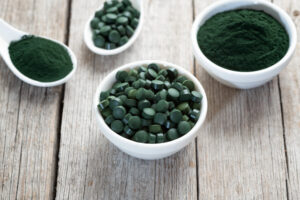Spirulina: The Foundation of Nutritional Biotechnology
Spirulina is a cyanobacterium, often referred to as blue-green algae, that has drawn considerable attention from researchers, biochemists, and nutrition scientists. Its cellular structure, photosynthetic properties, and exceptionally dense nutrient profile make it one of the most studied natural supplements in modern nutritional science. This microorganism thrives in alkaline water, harnessing sunlight to synthesize complete proteins, polyunsaturated fatty acids, pigments, and antioxidants essential for human health.
Unlike conventional plant proteins, spirulina contains all nine essential amino acids in bioavailable forms. Its primary protein, phycocyanin, also functions as an antioxidant, scavenging free radicals and modulating immune responses. Scientists have identified spirulina as one of the few naturally occurring sources of both gamma-linolenic acid (GLA) and superoxide dismutase (SOD) — enzymes and fatty acids vital to maintaining metabolic stability and reducing cellular oxidation.
1. Cellular Regeneration and Oxygen Efficiency
Spirulina’s dense concentration of protein and iron makes it an ideal supplement for supporting oxygen transport and red blood cell synthesis. The iron is chelated, enhancing absorption efficiency, while its chlorophyll and magnesium compounds assist in hemoglobin formation. In studies involving athletes, spirulina supplementation improved endurance and oxygen utilization by promoting higher mitochondrial output and reducing lactic acid accumulation during intense exercise.
At the molecular level, the algae’s peptides influence nitric oxide pathways, improving microcirculation and nutrient delivery to tissues. These findings explain why this superfood is increasingly recognized in clinical nutrition for improving aerobic performance and recovery.
2. Immune System Modulation and Anti-inflammatory Response
The immune-modulating capacity of spirulina stems primarily from phycocyanin and polysaccharides that activate macrophages, stimulate antibody production, and promote natural killer cell activity. Experimental data show that spirulina helps normalize immune responses, making it particularly effective in reducing chronic inflammation without suppressing immune strength.
By balancing cytokine production, the algae may reduce overactive inflammatory signals often associated with autoimmune or metabolic disorders. The pigment phycocyanin has been documented to inhibit the COX-2 enzyme pathway, contributing to its anti-inflammatory potential comparable to certain pharmaceutical agents.
3. Antioxidant Defense and DNA Protection
Oxidative stress is one of the primary contributors to aging and chronic disease. Spirulina’s complex of carotenoids, beta-carotene, and SOD provides multilayered antioxidant protection. Laboratory studies demonstrate that its compounds reduce DNA fragmentation in human lymphocytes exposed to oxidative agents, supporting genomic stability.
Furthermore, the synergy between vitamins C, E, and selenium in this algae enhances glutathione peroxidase activity — a central enzyme in cellular detoxification. This biological synergy underlines why researchers consider spirulina a “metabolic shield” capable of protecting cells from cumulative oxidative damage.
4. Detoxification and Chelation of Heavy Metals
One of spirulina’s most studied effects involves detoxification of heavy metals such as lead, mercury, and arsenic. The negatively charged cell walls of the algae bind positively charged ions, preventing their absorption and promoting safe elimination through the digestive tract.
A double-blind study published in Clinical Toxicology showed that individuals exposed to arsenic experienced significant reductions in toxin levels after consistent supplementation. The process is supported by chlorophyll and polysaccharide complexes, which enhance liver enzymatic function and accelerate bile secretion — both vital to systemic detoxification.
5. Lipid Regulation and Cardiovascular Function
Spirulina’s influence on lipid metabolism has been confirmed in both human and animal trials. It has been shown to decrease total cholesterol, reduce LDL oxidation, and raise HDL levels. The mechanisms involve modulation of hepatic lipid synthesis and enhancement of lipoprotein lipase activity, allowing the body to utilize fats more efficiently.
Additionally, nitric oxide-promoting peptides in this algae help relax arterial walls, reducing vascular resistance and blood pressure. The combined lipid-lowering and vasodilatory effects contribute to improved endothelial health — a cornerstone of cardiovascular longevity.
6. Glycemic Balance and Metabolic Efficiency
Scientific literature consistently supports spirulina’s ability to regulate glucose metabolism. It enhances insulin sensitivity and suppresses postprandial glucose spikes by activating AMP-activated protein kinase (AMPK), a key regulator of cellular energy homeostasis. In diabetic animal models, supplementation reduced fasting blood sugar and improved glycogen storage in the liver.
This metabolic modulation helps prevent glycation damage to tissues and supports stable energy levels throughout the day. For individuals managing insulin resistance, incorporating this microalgae into the diet provides measurable metabolic benefits.
7. Gut Microbiome Support and Digestive Health
The gut-brain axis is heavily influenced by diet, and spirulina plays a supportive role in microbial diversity. Its polysaccharides function as prebiotics, feeding beneficial bacteria like Lactobacillus and Bifidobacterium. The result is improved gut barrier integrity and reduced intestinal inflammation.
Enzymes produced by this algae, including proteases and lipases, assist in the breakdown of dietary fats and proteins. By reducing gastrointestinal inflammation, it can enhance nutrient assimilation and digestive comfort, making it particularly useful for individuals recovering from antibiotic use or chronic dysbiosis.
8. Neuroprotection and Cognitive Enhancement
Neuroscientific studies highlight spirulina’s neuroprotective potential due to its high levels of tryptophan, omega-3 fatty acids, and phycocyanin. These compounds assist in serotonin synthesis and improve neural membrane fluidity. Animal research has shown reduced neuronal apoptosis and improved cognitive performance following supplementation.
The antioxidant action of this superfood also protects neurons from reactive oxygen species — a major factor in neurodegenerative diseases such as Alzheimer’s and Parkinson’s. Some findings even suggest enhanced dopamine signaling and improved memory retention through consistent dietary intake.
9. Sustainability and Global Nutritional Impact
From an environmental science perspective, spirulina represents one of the most sustainable protein sources on Earth. It requires minimal land, absorbs large quantities of carbon dioxide, and produces oxygen during photosynthesis. Unlike animal agriculture, it generates negligible methane emissions and consumes up to 80% less water.
The United Nations and the World Health Organization have endorsed this algae as a key solution for addressing global malnutrition. Its rapid growth, minimal resource needs, and exceptional nutrient yield make it a candidate for both human nutrition and space exploration food systems.
Conclusion: The Future of Functional Nutrition
The biochemical profile of spirulina positions it as more than a supplement — it is a model organism in the study of functional nutrition and biopharmaceutical development. From supporting mitochondrial efficiency to regulating gene expression linked to inflammation, its applications extend into nutrigenomics and medical nutrition therapy.
While research continues to uncover new mechanisms, current evidence confirms that this ancient organism holds modern promise. Incorporating spirulina into daily nutrition bridges the gap between natural food sources and advanced nutritional biotechnology, paving the way for healthier populations and a more sustainable planet.
References
- U.S. National Library of Medicine – PubMed: Spirulina in Human Health
- National Institutes of Health (NIH): Spirulina Supplementation Review
- World Health Organization (WHO): Spirulina as a Nutritional Resource




